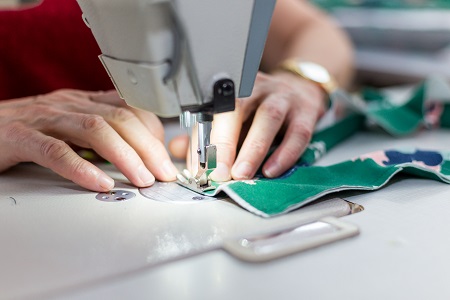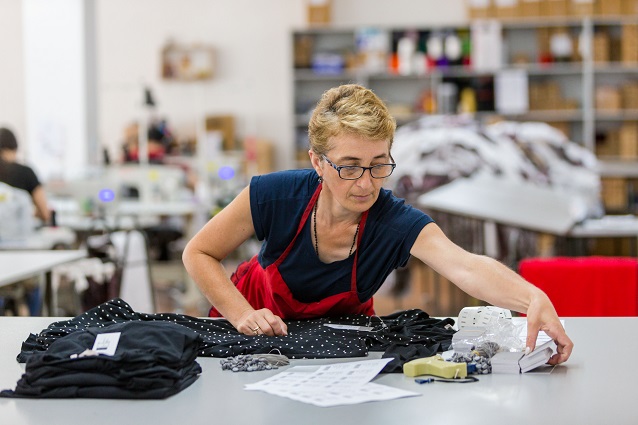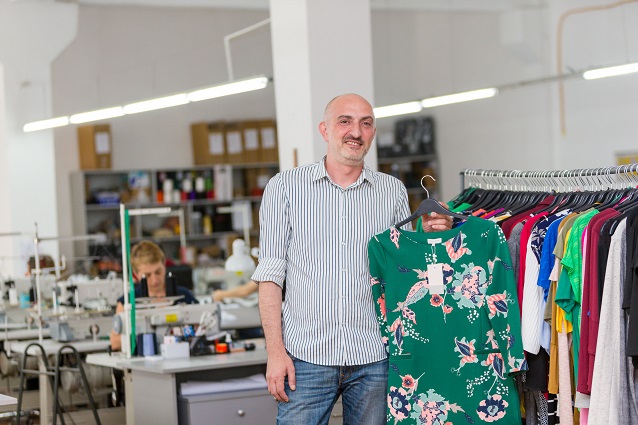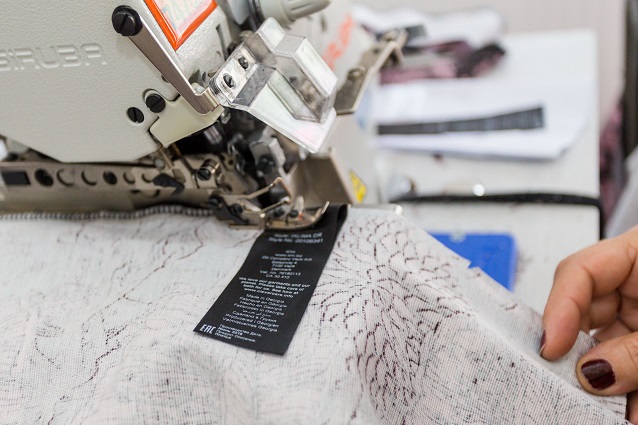Made in Georgia: EU support to help Georgian manufacturers meet key European standards


MPT Georgia has been producing apparel products for Danish multi-brand fashion group DK Company, a leading fashion company in Europe, for the last three years. The labels of various brands that are part of the group – Coop Denmark, Denim Hunter, B-Young, Fransa – read "Made in Georgia” in nine languages. The Danish company sells MPT Georgia-made clothing in Germany, the UK, Norway and Canada.
MPT Georgia upgraded its manufacturing facilities in 2015 thanks to €100,000 of Danish investment. DK Company is MPT Georgia’s main and constant client; however, the Georgian manufacturer has also cooperated with other Danish companies in the past, such as Kompagniet and Qiero.
Head of the company Mikheil Getia hopes that the rating recently received as a result of undergoing an ‘amfori BSCI (Business Social Compliance Initiative) audit’ – will help the company find other clients in the future. However, in order to do that, MPT Georgia will have to increase its production, as current production capacity is fully utilised at this stage.

High ranking on the amfori BSCI system audit provides proof that MPT Georgia meets European industry standards. Photo: EU4business.
The amfori BSCI audit assesses working conditions and social compliance with international industry standards. The EU-GIZ project ‘SME Development and DCFTA in Georgia’, implemented as part of the EU4Business initiative, helped MPT Georgia successfully to pass the amfori BSCI audit and receive the highest ‘A’ ranking. Since 2016, the EU-GIZ project has been implementing this initiative in the apparel sector in Georgia, with the aim of encouraging the integration of Georgian apparel producers into the EU market and supporting higher value exports.
European industry standards
High ranking on the amfori BSCI system audit provides proof that MPT Georgia meets European industry standards – fire-fighting standards, production process scheme, warehouse management, documentation management and labour rights have been improved in the company.

MPT Georgia's Director Mikheil Getia. Photo: EU4business.
"When the auditor arrived and assessed us for the first time the evaluation was very low – we received a ‘D’ grade. The auditor left us with recommendations we had to implement in order to improve labour safety and other mandatory standards. When I first took a look at the list of recommendations I thought it was impossible to implement them all."
With the help of international experts invited by GIZ we changed everything: starting from the production process and ending with document turnover. Eventually, it all led us to the result we have today – the company now has an image of a reliable partner in the European market,” Getia says.
Georgia’s advantage on that market is that Georgian company can produce and export small amounts of apparel products in a short period of time.
The Georgian apparel business is barely represented internationally. However, Georgia can attract new clients through introducing European standards in manufacturing. Additionally, our country has one advantage – ability to produce and export relatively small amounts of goods to the relevant destinations in a very short period of time,” says Mikheil Getia.
MPT Georgia employs 100 people. On average the enterprise can manufacture 25,000 t-shirts, 5,000 skirts and 10,000 thousand pairs of trousers per month.

The labels of various brands that are part of the group – Coop Denmark, Denim Hunter, B-Young, Fransa – read "Made in Georgia” in nine languages. Photo: EU4business.
Acquiring an ‘A grade’ once does not mean you will have it forever. The status will be updated and repeat audits have to be held.
"When you achieve a certain standard, you need to constantly improve it, not to drop it. If a client sees that you had a high ranking initially and then your performance dropped, it will no longer make another contract with you,” explains Getia. His company will have to go through the next BSCI audit cycle in two years.
Diversifying export markets
‘SME Development and DCFTA in Georgia’ project expert Rati Anjaparidze is certain that the enterprises that have been successfully audited under the amfori BSCI system will be able to diversify their export markets and client base more.
There are cases when apparel producers have one or two clients, which is a high risk. In case the client’s interests change or if for any other reason the client stops buying, the supplier company is left without a client on the European market. Therefore, a high ranking for amfori BSCI enables you to establish more stable contacts with European clients and become a reliable partner in their eyes,” said Anjaparidze.
Anjaparidze notes that it is very important for EU companies to have partnerships with enterprises where employers assume responsibility to protect their employees’ labour rights, they are also interested in having reliable suppliers. In the EU, industry players also assume social and other responsibilities and establish relevant standards both for local, European producers, as well as the global supplier chains. Amfori BSCI incorporates such standards.
The EU and GIZ project is also cooperating with three more companies in preparing them for the amfori BSCI audit – Elselema, Eurotex and Materia Fashion House.
The elaboration of a National Strategy for Apparel Sector Development is also planned with EU and GIZ assistance, which should encourage diversification and exports of goods produced in Georgia.
Funded by the EU and implemented by GIZ, the ‘SME Development and DCFTA in Georgia’ project assists Georgian small and medium-sized enterprises (SMEs) to become more competitive and adapt to the new regulatory environment created under the DCFTA. It lays the ground for strengthening of the SME sector to ensure a broad-based growth.
The project is part of the EU4Business initiative, which brings together all EU programmes assisting SME and private sector development in Georgia. It enables the private sector to take advantage of the opportunities offered by the EU Deep and Comprehensive Free Trade Agreement, which gives Georgia access to a common market of 500 million consumers.
Between 2009 and 2017, the EU has contributed €69 million under EU4Business in Georgia, triggering €882 million worth of loans to Georgian companies, supporting almost 40,000 enterprises and creating more than 10,000 new jobs.
 Tweet
Tweet  Share
Share